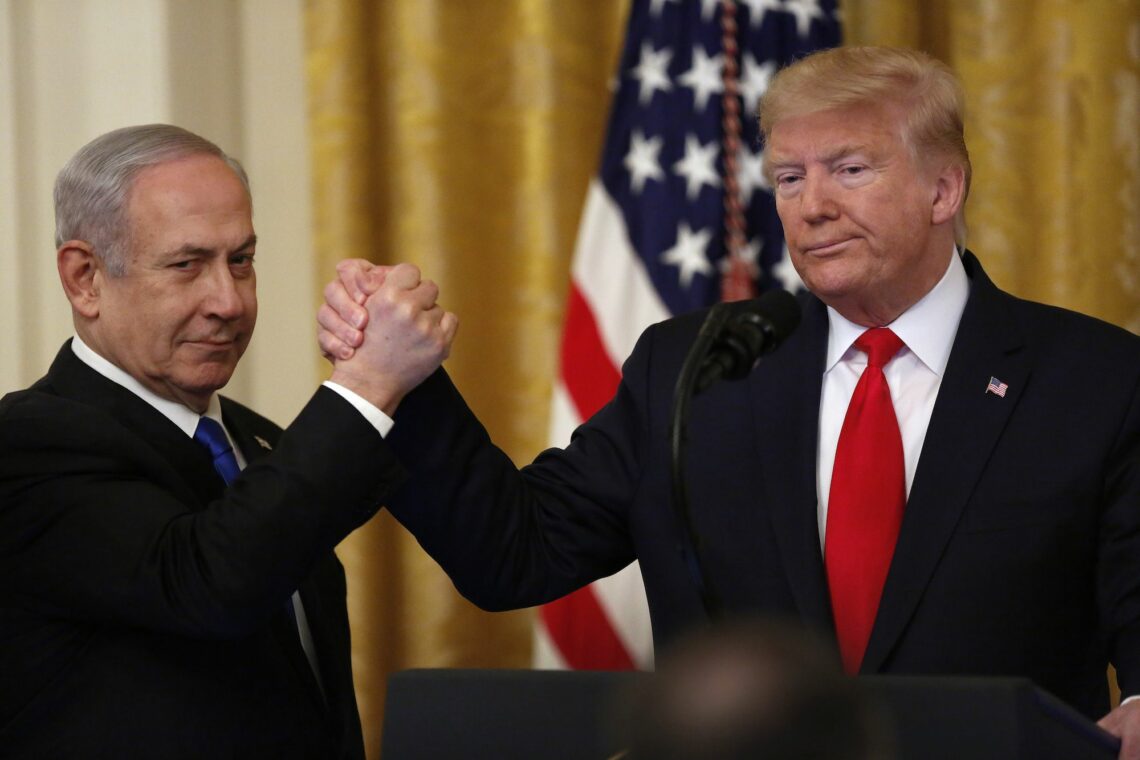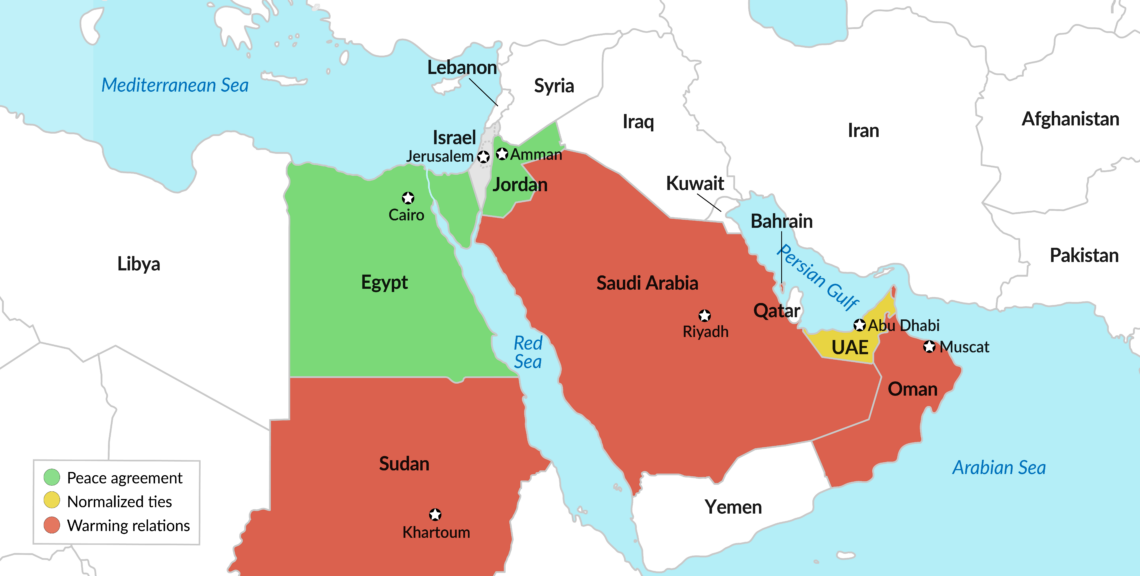Seen from Israel: The game-changing UAE deal
The normalization of ties between Israel and the United Arab Emirates came as a shock to many, dispelling the mythical belief that solving the Palestinian issue was a prerequisite to any new peace deal. Other Arab countries may follow suit.

In a nutshell
- The UAE-Israel deal rewrites assumptions about the conflict
- Agreements with Oman, Bahrain and Sudan may follow
- All await the reaction from Turkey and Iran
“Historic Peace Agreement,” tweeted United States President Donald Trump on August 13, to announce the surprise deal between Israel and the United Arab Emirates.
The accord, expected to lead to full normalization between the two countries, is not only a milestone in the Israel – Palestine conflict but clarifies the divide between the pragmatic Arab camp and that of the radical Islamists. Moderate Arab states and Israel have improved their situation, while rivals Shia Iran and Hezbollah, as well as Sunni Turkey, Qatar and the Muslim Brotherhood, are all reeling from the shock.
Old rules
The deal belied the almost mythical belief that, although Egypt and Jordan had made peace with Israel, no other Arab country would do so until a Palestinian state was established within the so-called 1967 borders. This belief was fostered by two non-Arab states, Iran and Turkey. The first, in line with its deep-seated aversion to the Jewish state, and the second to curry favor with Arab states and reinforce its standing in the region.
The deal was a bitter blow to the Palestinians. They had begrudgingly come to terms with the 1979 peace agreement between Israel and Egypt and in 1995 between Israel and Jordan. Both were born of strategic necessity, as a series of military defeats had severely impacted their respective economies. Egypt decided to jettison its alliance with the Soviet Union, which had pushed for confrontation with Israel, in favor of cooperation with the U.S., which promoted peace and provided Cairo with economic and security assistance.
For its part, Jordan had carried out secret contacts with Israel for many years and was induced by the Egyptian precedent to bringing them out in the open. The country bypassed the Palestinian veto to make a deal, which reinforced both its safety and its relations with the U.S. Nevertheless, it was a cold peace, and full normalization was postponed in both cases “until the Palestinian issue was resolved.”
Facts & figures

A natural target
The UAE belongs to the “second tier” of Arab states and is geographically far removed from Israel with no history of actual fighting. There is no hatred for the Jewish state in the country, and indeed, the emergence of a small Jewish community was encouraged during the last decade.
Being an Arab state and a member of the Arab League, the UAE was drawn into the Arab-Israeli conflict, but over time it began to see how it was hurting its vital interests. Meanwhile, the Palestinians were rejecting peace initiatives without presenting one of their own or seeking compromise. Most recently, the Palestinian leadership rejected out of hand the Trump administration peace plan, which provided a basis for negotiations with Israel, leading to an independent state. They were unwilling to accept the legitimacy of the Jewish state, and are bent on isolating it with the help of Arab and Islamic states (at times aided by the European Union).
The American president, fighting for re-election and needing a foreign policy success, was only too willing to help.
All the Gulf states share the UAE analysis. They feel threatened by Iran’s progress toward nuclear weapons and realize that their sole potential ally in the region is Israel — with its vast technical capacities, and close ties to the U.S. They were held back by the Palestinian veto for a time, but soon discreet contacts were being made. By the 1990s, there were exchanges of security information and semi-official meetings (with officials no longer in office). As trust grew, cooperation on intelligence and security expanded.
Of late, Israeli ministers – and even Prime Minister Benjamin Netanyahu – openly visited Oman. Israeli athletes were allowed to take part in international sports events. The Gulf states became more aware of what Israel could offer in science and technology, agriculture, water management techniques and more. Today, there is $1 billion per year in informal trade between Israel and the Gulf states.
Getting to yes
That it was the Emirati Crown Prince, Mohammed bin Zayed, who took upon himself to bring about normalization should not come as a surprise. Known as MbZ, he is the deputy supreme commander of the armed forces, and the country’s de facto ruler. He enjoys a close friendship with Saudi Crown Prince Mohammed bin Salman, 24 years his junior, and is reputed to mentor to the younger royal. A careful and realistic leader determined to keep away from regional rivalries and the Arab world’s religious fanaticism, Mr. Zayed has focused on developing his country’s economy and keeping it safe – while making it clear that he wants the Emirates to become a major regional player.
The UAE is an oil-rich federation of seven emirates with a total population of less than 10 million (of which only one-tenth are Emirati citizens), but a gross domestic product (GDP) of more than $420 billion. Recently, it inaugurated the first nuclear reactor for producing electricity in the Arab world. Its army is equipped with top-notch equipment and weaponry and has been deployed on several fronts, assisting (together with Egypt) General Haftar in Libya and Saudi Arabia in Yemen.
The Emirati leader turned the Trump peace proposal to his advantage, using it to advance his own agreement with Israel. The American president, fighting a difficult reelection battle and badly needing to claim a foreign policy success, was only too willing to help.
Announced on August 13, the deal provides for full normalization with Israel, which in turn agreed to suspend annexation of parts of the West Bank at the Americans’ and the Emiratis’ request. In effect, this was peace in exchange for postponing annexation indefinitely. It rendered obsolete the Saudi peace plan that had been the cornerstone of Arab policy toward Israel and makes it possible for other countries to follow suit and act in their real interests.
Mutual interest
The peace agreement is a tribute to the skills of the Prime Minister of Israel, Benjamin Netanyahu, who for many years has been working to foster ties with Gulf and other second-tier states to break the Palestinian “taboo” on normalization. He believed that if these countries could see what they would gain from the relationship with Israel, they would move forward – and, ultimately, drag the reluctant Palestinians closer to a peaceful solution of the conflict.
Though it was not spelled out, there was another side to the deal that undoubtedly carried weight with the Emirates. In the course of the negotiations, the U.S. hinted that their demand to acquire sophisticated weapons, such as drones of the new generation and F35 fighter planes, which had been pending for years, could receive a favorable response should full normalization with Israel materialize. In such a case, Congress could lift part of the restrictions imposed on weapon sales to countries at war with Israel, helping preserve Israel’s military superiority (the so-called QME, or qualified military edge).
President Trump is now saying that there are talks with Congress regarding the sale. The U.S. itself has a vested interest in strengthening the Emirates against the looming threat of Iran, situated on the other side of the straits of Hormuz. It must be added that the multibillion dollar sale would also be a welcome boost for American industries.
Regional reviews
Still, annexation remained a stumbling block; it could have triggered a violent response from Iran and from Turkey, and sporadic unrest that could affect the Emirates. The issue was shelved despite objections from the rightwing parties in Israel. Iran did protest the agreement and called on MbZ to cancel it, while Turkey threatened to cut off relations and recalled its ambassador. Ankara, which vies for the title of defender of Islam and initiates benevolent programs for denizens of East Jerusalem, was fuming because the joint agreement called on all peace-loving Muslims to come and pray at the Al Aqsa compound there.
The UAE nevertheless attempted to appease the Palestinians and their supporters. Anwar Gargash, the minister of state for foreign affairs, emphasized that the agreement has in no way endangered the two-states solution. Foreign Minister Abdallah bin Zayed declared that canceling the annexation was a breakthrough in relations between Arabs and Israel. It did not help.
Palestinian President Mahmoud Abbas compared the deal to a knife in the back, accusing the Emirates of having betrayed Jerusalem, the Palestinians and the Saudi peace initiative. He ordered his ambassador to return from Abu Dhabi. Sheikh Muhammad Hussein, Grand Mufti of Jerusalem and the Palestinian Territories, issued a fatwa forbidding Emiratis from praying in the Al Aqsa compound.
Despite his support, El-Sisi is worried that the UAE deal will expose his own country’s approach to Israel.
Jordanian authorities declared cautiously that they saw in the move an answer to the Palestinian demand to stop the annexation but insisted on creating an independent state along the 1967 borders.
Two of the Emirates’ closest allies in the region, Bahrain and Egypt, welcomed the news. Bahrain, widely expected to be the next state to strike a deal with Israel, declared that the UAE had shown “wise leadership” and taken a step “toward the achievement of peace in the Middle East.”
Egyptian President Abdel-Fattah El-Sisi, who has the full support of the Emirates in the Libyan crisis, tweeted that the deal was aimed to “stop Israel’s annexation of the Palestinian territories” and “achieve prosperity and stability for our region.” The Egyptian religious authority Al-Azhar, known for opposing any form of normalization with Israel, remained silent – probably in order not to risk worsening the fraught relations with the president by issuing a contradictory statement to his own.
Despite his apparent support, Mr. El-Sisi is worried that a full normalization between the Emirates and Israel – from economy to technology, medicine and more – will show the foolishness of his country’s long efforts to avoid normalization after 40 years of peace. Moreover, Egypt has neither the financial wherewithal nor the political openness for extensive cooperation with Israel.
Facts & figures
Two precedents
The UAE is the third Arab country to formally normalize relations with Israel, and the first in 26 years:
Israel-Egypt Treaty
- Signed in 1979 by Anwar Sadat and Menachem Begin
- Six years after the two countries fought in the Yom Kippur War
- Israel withdrew from the Sinai Peninsula, captured in 1967
- Egypt recognized Israel and opened the Suez Canal to its ships
Israel-Jordan Treaty
- Signed in 1994, by King Hussein of Jordan and Yitzhak Rabin
- Finalized in Washington, D.C. beside U.S. President Bill Clinton
- A year after the Oslo I Accords, which began the peace process
- Addressed territory, security, water access, trade and more
Who’s next?
There have been contacts between Israel and Sudan since the ouster of President Omar al-Bashir. Mr. Netanyahu met in Uganda in February 2020 with the head of the Sovereignty Council of Sudan, Lieutenant General Abdel Fattah al-Burhan. Following the agreement with the UAE, some contradictory statements were issued, a result of rivalries in the council. Yet, U.S. Secretary of State Mike Pompeo, who recently visited the country, said fruitful negotiations were ongoing. Peace with Israel could lead to Sudan being removed from the American list of countries supporting terrorism.
It took six days for the Saudis to issue a tepid reaction to the deal: “Peace must be achieved between the Israelis and the Palestinians, on the basis of international parameters. Once this goal is achieved, anything is possible,” said Saudi Foreign Minister Faisal bin Farhan Al Saud. He added that his country was still committed to its peace initiative – Israeli withdrawal to the 1967 lines, establishing a Palestinian state and returning all Palestinian refugees (the last spelling the end of Israel).
Covert relations have a long track record, and a suitable formula with the Saudis will probably be found in time.
The response reflects Riyadh’s traditional position and that of the king, who is not as attuned to the profound changes affecting the Middle East as his son, Crown Prince MbS. It must be remembered that Saudi Arabia is situated in the Arabian Peninsula, the cradle of Islam, and holds its two holiest sites, Mecca and Medina. As such, it cannot have full and official relations with Israel as things stand today.
Covert relations, however, have a long track record and a suitable formula will probably be found in time – especially since MbZ managed to bypass the Saudis and strengthen his ties with the U.S. Indeed, Saudi Arabia has just opened its airspace to Israeli commercial flights.
Scenarios
On the thorny Palestinian issue, Crown Prince Mohammed Bin Zayed has an ace up his sleeve: Mohammed Dahlan, the former security chief in Gaza. Later expelled from the Palestinian Fatah and living in exile in Abu Dhabi, Mr. Dahlan is reportedly a close advisor to the prince. A bitter enemy of Mahmoud Abbas, he will try to take over whenever the ailing Palestinian president leaves the scene.
It is too soon to fully evaluate the impact of the Emiratis’ bold initiative. The U.S., Israel and the UAE will do their best to turn the normalization deal into a success story, to show the vast potential of peace. Normalization agreements in a variety of contexts are expected to be signed shortly. The UAE deal’s implementation will begin as soon as possible, for the benefit of both countries involved and to showcase results to Bahrain, Oman, Sudan and even Morocco, widely expected to follow suit but still undecided. The U.S. and Israel, with the strong backing of the Emirates, will work overtly and covertly to persuade them.
What, if any, will be the level of response by Iran and Turkey? Will it include violence? There will probably be a period of wait and see to evaluate the fallback and the results on the grounds. Both sides, the pragmatic and the radical, await the November presidential elections in the U.S., as much will depend on the political agenda of the new incumbent. President Trump would keep advancing his plan; the Democrat Joe Biden, who welcomed the normalization agreement between Israel and the UAE, would have to juggle his friendship with Israel against the pro-Palestinian left flank of his Democratic party.







